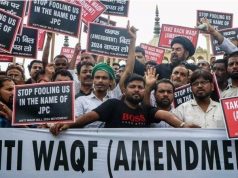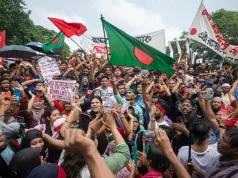“Certain societies may respect the rule of force —
We respect the rule of law”
-John F. Kennedy
From Ancient society to the modern world, the most strengthening position of any state is identified in terms of State sovereignty, which is defined as “the State is neither a dependency nor a dominion of any other nation, but an Independent nation as to govern its internal affairs without external interference.” As, the state is a political identity, to maintain the sovereignty and functioning of the state, the laws are formulated in a way that:
Ordinary laws – For maintaining public order, and smooth functioning of the state in normal circumstances.
Special laws – For the Security of the state and to tackle the worst situation for the operation of law.
Here, I will discuss the constitutionality and the compatibility of preventive detention laws with ordinary laws in India.
Preventive Detention & Indian Constitution
The expression, “preventive detention”, was used for the first time in Britain. The word “preventive” means that restraint, whose object is to prevent probable or possible activity, which is apprehended from a would-be detenu on grounds of his past activities.
Mostly, Indian leaders were detained under the preventive detention laws legislated by the Britishers. Irrespective of that, they embodied the doctrine of Preventive detention under Article 22 of the Indian constitution. Both the Central and state legislature is competent to make laws about preventive detention, given under Entry 9 of List 1 and Entry 3 of List 3, respectively, of Schedule 7 of the Indian Constitution.
The first Preventive detention law in India was passed on February 26, 1950. It was mainly enacted for temporary purposes and ceased on April 1, 1951, but it lapsed on 21 December 1969.
Article 22 of the Indian Constitution
Article 21 requires a procedure which is just, fair, and reasonable for the deprivation of Life and Personal Liberty, so to say Article 22 inscribed that procedure which is compatible and included in any procedure enacted by the parliament. Article 22(3) reads as Nothing in clauses (1) and (2) shall apply (a) to any person who for the time being is an enemy alien; or (b) to any person who is arrested or detained under any law providing for Preventive detention.
No Country in the world provides any space for preventive detention in the Constitution except India. Indian Constitution is the unique one, which inscribed the Provision for Preventive Detention. Mainly, Detention may be categorized into two parts:-
- Punitive Detention: detention of a person for the offense which they have committed
- Preventive Detention: Someone in custody without a court trial and conviction. The goal is to deter a person from committing an offense or attempting to commit or prepare to attempt to commit an offense, in the future, against public order, state security, and so on.
Article 22, embodies the doctrine of Preventive detention, which provides that if a person is detained under the preventive detention laws, guarantee the certain safeguard provided under clauses (4) to (7) and can’t directly proclaim the immunity provided under article 22(1) & (2) and to the accused person:
Provision of Preventive Detention and the Principle of Criminal Law
In general, if a person is charged under criminal law for the offense of any offense it is supposed to be that:
- “There is a presumption of innocence” which means the accused person is assumed to be innocent until proven guilty.
- “Burden of proof lies on Prosecution” signifies that prosecution has a responsibility to prove the accused person an offender.
- Sufficient evidence or witness must be present before the court otherwise, the acquittal will be held;
- The proceeding is running before the ordinary courts;
- The Identity of the witness will be disclosed.
But in Preventive detention law–
- “There is a presumption of guilt” means the accused person is assumed to be guilty until proven innocent;
- “Burden of proof lies on the accused” meaning thereby accused has a responsibility to prove himself innocent, otherwise, the conviction will be the result;
- Lack of evidence or witnesses leads to the conviction of the accused person;
- The proceeding is institutionalized before the special court;
- Mostly, the identity of the witness is not revealed. The cross-examination is done by a separation made out of a curtain.
Discriminatory and Partisan Use of the Law
The Indian experience so far suggests that once security laws create expansive executive power, empowered governments are not cautious about using that power. Security laws have lent themselves to religious and ethnic discrimination, trace how POTA prosecutions relied heavily upon religious profiling, and describe the Act as “creating suspect communities”.
Security laws have enduring appeal not because they make it easier to investigate and punish terrorist and separatist violence, but because they allow the state to pull individuals and groups out of circulation without having to prove wrongdoing beyond a reasonable doubt. Security laws that create terrorist offenses and special courts add to the state’s preventive powers by allowing easier arrests and long periods of remand.
In addition, overlap and intersections between preventive detention and draconian laws, as well as between security law and ordinary criminal law, can be used in concert to further enhance the state’s preventive and procedural powers.
Conclusion
Human rights groups, domestic and international, have recommended reforming India’s anti-terrorism laws, preventive detention laws, and AFSPA for many years. They have traced how these laws depart from international legal standards and detailed the substantive and procedural changes needed to conform to these standards.
These laws have created long-running exceptions to constitutional checks and balances that leave individuals vulnerable to abuse. This, in turn, will push against the steady diminution of constitutional constraints that has allowed Indian security laws to operate as charters for abuse.
To conclude my words with the some couplet of Maulana Amir Usmani –
“jahl parwada-e-qadre ye nirale qanoon
zulmo adwam ki taksal ma dhalay qanoon
tishnagi nafs ke jazbo ki bujhane ke liya
noo e insan ke banaye hue kalay qanoon
aisay qanoon see nafrat hai adaawat hai mujhe
in se har sans may tehreek-e-bhagawat hai mujhe”






